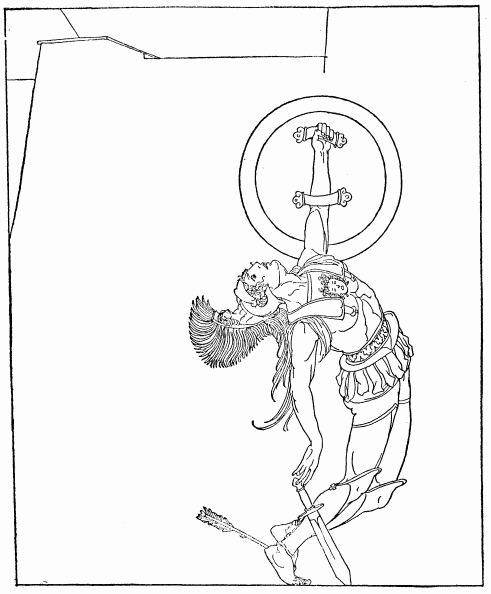Phaespxria

More Posts from Phaespxria and Others
wish the piraeus archaeological museum had a public catalog but hey everyone check out this c. 420-410 funerary stele from salamis with a tragic actor staring at his mask


only you.




?????



thank you troy 2004 for helping me objectify the trojan princes





Regretful be the heart, Penitent One.
BLASPHEMOUS (2019) dev. The Game Kitchen






some of willy pogany’s illustrations from padraic colum’s the adventures of odysseus and the tale of troy, 1918

ClassicsTober Day 5: Chiron
Everyone you raised.

I wanted to adapt one of my favorite scenes from the Iliad into a comic ✨ the dialogue borrows and takes direction/inspiration from various translations, although pacing, general flow of the words, and page space got the final say in what I ultimately ended up deciding to letter.

(Iliad, book 20, trans. fagles)

(same scene, trans. lattimore)
society6 | ko-fi | redbubble | twitter | deviantart
thinking of King Priam's grief, watching Teucer, the child of the sister who was stolen from him and Troy all those years ago, the sister who he has longed for all these years, stand against him and his children during the trojan war
There's been some amount of academic discussion about Paris' two names - usually in terms of which is earlier and where they come from and what epithets are used with which name. (Most of his epithets "belong" only to Alexander, if you're curious.) But, a small branch of it is "who uses what name, in-story, in the Iliad" ; Ann Suter (this woman, uhh her ideas are pretty crazy so approach with awareness of that), I.F. de Jong and, commenting on especially the latter's article, Michael Lloyd.
I lean more towards Lloyd's assessment that de Jong's premise (that "Paris" is between the Trojans and "Alexander" for the Achaeans as a sort of 'international' name) can't really be supported. But! That doesn't mean you still can't have fun with the split in names and get something in terms of character and worldbuilding out of that!
So, first of all, in the Iliad, "Alexander" is used far more than "Paris". Only Hektor ever uses "Paris" in direct speech, about or to him (we'll get back to Hektor).
Everyone else, Achaean or Trojan, uses Alexander.
Both Suter and de Jong would, in various ways, either ignore this or explain it away as a "this only happens when the Trojans are talking to Achaeans" (Hektor, before the duel), or "what is said is going to be said to Achaeans" (Priam, telling Idaeus what to report to the Achaean commanders). Honestly, that seems overly complicated and not very reasonable to me. Especially in the case of Priam, if Paris was the name he's most used to using, there is no reason for him not to use Paris and then Idaeus simply switches when reporting the speech to the Achaeans. Yes, reported speech/instructions are usually relayed verbatim, but switching a name wouldn't be changing what's actually been said.
And, anyway, coming back to Hektor, who is the one to most consistently use Paris? Also uses Alexander, when thinking to himself, in his own head. (He also uses Paris to Achilles.)
Myth-wise, in various later sources you get the very logical conclusion of "one name was given by his foster father, the other by his royal parents". (Though there's not necessarily any consistency, even with one writer, which name was given by whom.)
Given the way the Iliad prioritises Alexander, I'd go with that Alexander is the name Priam and Hecuba gave their son, even if he was going to be exposed, before giving him away. Given how Alexander is used by basically everyone to address him, this would make good sense, I think. The Achaeans would only know of Alexander, prince of Troy, and that is certainly the name most/all Trojans would use. Paris is then the name given him by his foster father. Hektor using it can be turned into a look into their relationship, because what you see is Hektor using the name of the "outsider" (by a bare technically "not" his brother), to insult his brother, when he's angry. A verbal distance to add to the emotional one, if not one that's complete and sometimes blurs.
(This doesn't take into account post-Iliad sources, where 'Paris' vastly outnumber the uses of 'Alexander'.)
-
 phaespxria reblogged this · 1 month ago
phaespxria reblogged this · 1 month ago -
 phaespxria liked this · 1 month ago
phaespxria liked this · 1 month ago -
 sleepy-pigeonn liked this · 1 month ago
sleepy-pigeonn liked this · 1 month ago -
 oftheoscarwildesortt liked this · 1 month ago
oftheoscarwildesortt liked this · 1 month ago -
 ilions-end reblogged this · 1 month ago
ilions-end reblogged this · 1 month ago -
 boondockfn9 liked this · 7 months ago
boondockfn9 liked this · 7 months ago -
 limitlesslfgt liked this · 9 months ago
limitlesslfgt liked this · 9 months ago -
 esse-est liked this · 9 months ago
esse-est liked this · 9 months ago -
 gaybrealdreamer55 liked this · 9 months ago
gaybrealdreamer55 liked this · 9 months ago -
 petdee2000dee liked this · 9 months ago
petdee2000dee liked this · 9 months ago -
 cutenonude reblogged this · 9 months ago
cutenonude reblogged this · 9 months ago -
 gayeroticartworld reblogged this · 9 months ago
gayeroticartworld reblogged this · 9 months ago -
 gayeroticartworld liked this · 9 months ago
gayeroticartworld liked this · 9 months ago -
 viniciusleal2121 liked this · 9 months ago
viniciusleal2121 liked this · 9 months ago -
 bucephalus2000 liked this · 9 months ago
bucephalus2000 liked this · 9 months ago -
 howeveragain reblogged this · 9 months ago
howeveragain reblogged this · 9 months ago -
 mimis51-blog liked this · 9 months ago
mimis51-blog liked this · 9 months ago -
 water-men-light liked this · 9 months ago
water-men-light liked this · 9 months ago -
 liebestod-tchai liked this · 9 months ago
liebestod-tchai liked this · 9 months ago -
 charpnatl liked this · 9 months ago
charpnatl liked this · 9 months ago -
 enchantingcolortacogarden reblogged this · 9 months ago
enchantingcolortacogarden reblogged this · 9 months ago -
 arfur reblogged this · 9 months ago
arfur reblogged this · 9 months ago -
 belovedrival reblogged this · 4 years ago
belovedrival reblogged this · 4 years ago -
 somusicdragon liked this · 4 years ago
somusicdragon liked this · 4 years ago -
 stardustmanblue liked this · 4 years ago
stardustmanblue liked this · 4 years ago -
 imperator-caesar-augustus92 reblogged this · 4 years ago
imperator-caesar-augustus92 reblogged this · 4 years ago -
 belovedrival liked this · 4 years ago
belovedrival liked this · 4 years ago -
 edmdantes reblogged this · 4 years ago
edmdantes reblogged this · 4 years ago -
 edmdantes liked this · 4 years ago
edmdantes liked this · 4 years ago -
 andr83wa liked this · 4 years ago
andr83wa liked this · 4 years ago -
 tulsaartist918 liked this · 4 years ago
tulsaartist918 liked this · 4 years ago -
 midwesternartlovertraveler reblogged this · 4 years ago
midwesternartlovertraveler reblogged this · 4 years ago -
 midwesternartlovertraveler liked this · 4 years ago
midwesternartlovertraveler liked this · 4 years ago -
 gaytimespast1940 reblogged this · 4 years ago
gaytimespast1940 reblogged this · 4 years ago -
 gaytimespast1940 liked this · 4 years ago
gaytimespast1940 liked this · 4 years ago -
 buriedanddead reblogged this · 5 years ago
buriedanddead reblogged this · 5 years ago -
 alhsblog-blog liked this · 5 years ago
alhsblog-blog liked this · 5 years ago -
 blacklabel-things liked this · 5 years ago
blacklabel-things liked this · 5 years ago
